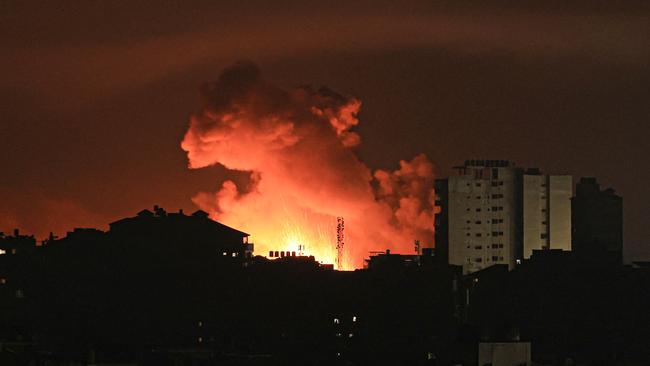Tim Boreham: History says fog of war quickly lifts for markets
War has a devastating, often ongoing, effect on those caught in its chaos. But healing of the financial market tends to be fast, says Tim Boreham.

Business
Don't miss out on the headlines from Business. Followed categories will be added to My News.
With the world’s eyes distracted by the grinding Ukraine conflict, we have all been reminded that while Israel-Palestine tensions might go quiet from time to time, there’s no enduring peace.
Financial market analysts have been clamouring to make sense of the implications – a difficult ask given the fluidity of the situation. But the experience of past conflicts is that despite the human suffering, share and bond markets tend to be unmoved.
As of Thursday, the S&P 500 index was up about one per cent since last weekend’s atrocities unfolded, with gold up three per cent and Brent crude oil edging up 1.5 per cent (having been four per cent higher earlier in the week).
For the best columnists, sign up here for free Stockhead daily newsletters
Oil still remains around eight per cent below the levels of two weeks ago, before the price slid on concerns of an economic downturn.
Meanwhile, US treasury bonds are higher – and yields thus lower – as investors seek the comfort of such defensive assets. In theory this serves to moderate inflation if oil prices do spike.
Much of the coverage is a nod to the 1973 Yom Kippur War, which spurred the Arab oil embargo that quadrupled oil prices and caused rampant inflation and a deep recession.
At this stage, the oil dynamics look very different because the US is a net hydrocarbon exporter, while China is Saudi Arabia’s biggest customer.
Saudi Arabia, meanwhile, doesn’t look in a rush to join any embargo 2.0 but the politics of petrodollars are well beyond your columnist’s ken.
Of course Israel – and the Palestine territories – barely have a barrel of their own oil.
MORE TIM BOREHAM: Catch a falling Star? | Sport stocks vying for selection | Divvies down, but beating banks
An informative table from Principal Asset Management suggests that conflicts tend not to move the dial for equities – or only temporarily.
After the 2001 World Trade Centre attacks, the S&P 500 fell 12 per cent over 10 days, but six months later the index was up five per cent. And this was the event that brought terrorism to Wall Street’s front door.
The ensuing US invasion of Iraq saw the index plunge five per cent, but within a month it was five per cent higher.
The first and second gulf wars of 1990-91 and 2003 prompted oil price spikes of varying degrees, but eventually share markets rallied.
Or at least they did up to 2007, when the Global Financial Crisis – not geopolitical events – spurred one of the worst sell downs in history.
The 1962 Cuban missile crisis resulted in a seven per cent sell off over eight days, as the world faced the cheery prosect of nuclear obliteration.
A month later the index was up seven per cent, albeit after Comrade Khrushchev blinked and removed the offending weaponry from the island.
Visit Stockhead, where ASX small caps are big deals
The most enduring sell off followed the Yom Kippur hostilities and the oil embargo, with a 14 per cent sell off over 46 days and a recovery period of 2246 days.
So what do investors do in the wake of this unexpected geopolitical event which even Mossad’s finest failed to anticipate?
The truth is not much, beyond avoiding riskier assets such as cryptocurrencies, emerging markets and speccie lithium stocks.
“While we do not expect a major impact as long as the crisis remains local, we see some risks for oil should the conflict take a broader dimension,” says European asset manager Amundi.
Principal Asset Management says “while geopolitics typically has a short-lived direct market impact, the indirect impacts via inflation, confidence and economic growth can be more persistent and, ultimately, more damaging.”
In the meantime investors should keep calm and carry on – which the traumatised citizenry of Israel and Gaza Strip are trying to do.
This story does not constitute financial product advice. You should consider obtaining independent advice before making any financial decisions.
Find more Tim Boreham wisdom on stockhead.com.au
SUBSCRIBE
Get the latest Stockhead news delivered free to your inbox. Click here
Originally published as Tim Boreham: History says fog of war quickly lifts for markets



